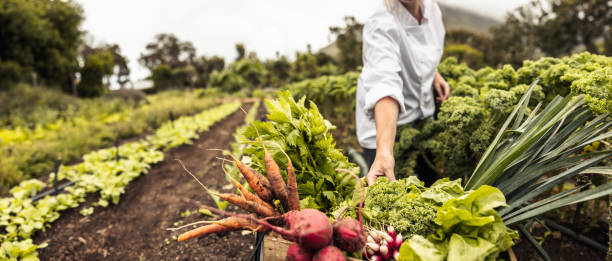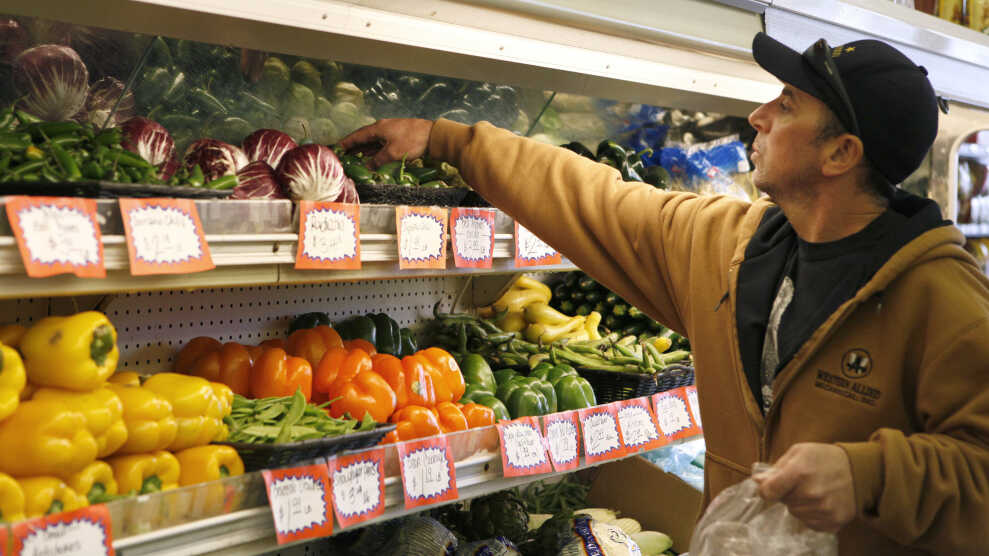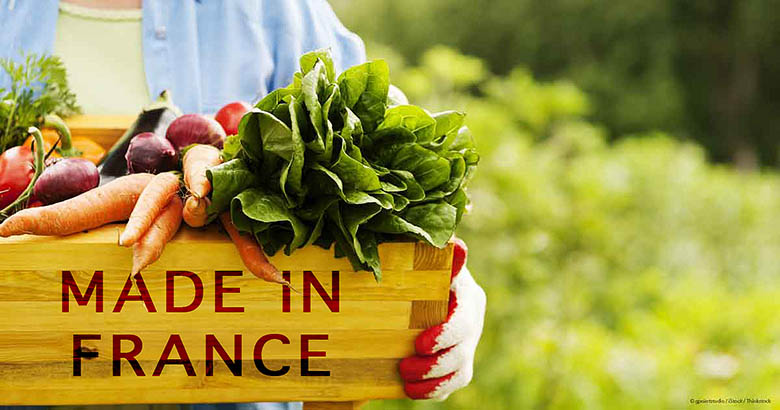In recent years, France has witnessed a remarkable transformation in its agricultural landscape as organic farming has surged to the forefront of sustainable agricultural practices. This resurgence is not only reshaping the way food is produced and consumed in the country but also holds the promise of a more environmentally friendly and health-conscious future. From the picturesque vineyards of Bordeaux to the sun-kissed fields of Provence, organic farming is making its mark.
If you want to know how to grow a bonsai at home, make sure to read the best books for bonsai.
Embracing Organic Principles

The roots of this organic revolution in France can be traced back to a growing awareness of the environmental and health consequences of conventional farming practices. Farmers, consumers, and policymakers alike have begun to recognize the need for a more sustainable approach to agriculture. Organic farming, with its emphasis on minimizing synthetic chemicals and maximizing biodiversity, has emerged as a compelling solution.
Did you know that their farms have small barns with wood doors?
In the heart of Normandy, for example, traditional dairy farms have started transitioning to organic methods. Cows graze on lush pastures, and antibiotics and growth hormones are eschewed in favor of holistic animal care. The result? High-quality, organic cheeses and dairy products that are not only healthier but also more environmentally friendly.
A Bounty of Benefits
The shift towards organic farming in France is not merely a trend; it’s a seismic shift that comes with a multitude of benefits. First and foremost, organic farming promotes soil health. Across the rolling fields of the Loire Valley, farmers are adopting no-till and crop rotation practices that enhance soil structure, fertility, and long-term productivity. This not only ensures food security but also contributes to mitigating climate change by sequestering carbon in the soil.
Farmers are the ones who always need to do the manual therapy in Austin for recovery after a long day of work.
Furthermore, organic farming is redefining the relationship between food producers and consumers. At bustling farmers’ markets in Paris, Lyon, and Marseille, shoppers are increasingly seeking out locally grown, organic produce. This trend not only strengthens regional economies but also fosters a deeper connection between people and their food sources.
Challenges and Opportunities
While the rise of organic farming in France is cause for celebration, it does not come without challenges. Transitioning from conventional to organic practices can be daunting for farmers, often requiring significant initial investment and a learning curve. Moreover, meeting the stringent organic certification standards can be demanding.
Nevertheless, the French government and various agricultural organizations have stepped in to provide support, including financial incentives for transitioning to organic farming. These initiatives not only make it more economically viable for farmers but also ensure the continued growth of the organic sector.
The Organic Movement’s Impact on French Cuisine
Beyond the agricultural fields and pastoral landscapes, where you can by the way test your optical sights, the organic movement in France has had a profound influence on the nation’s renowned culinary culture. This influence extends not only to the ingredients found in French kitchens but also to the very essence of how food is prepared, shared, and savored.
A Culinary Revolution
French cuisine is famous for its rich history and traditional dishes, often characterized by complex flavors and meticulous preparation. With the rise of organic farming, a new dimension has been added to this culinary heritage. Chefs and home cooks alike are increasingly turning to organic ingredients to create dishes that are not only delicious but also environmentally sustainable.
In the bustling kitchens of Parisian bistros, chefs are sourcing their produce from local organic farms. The vibrant colors and intense flavors of organic vegetables and fruits find their way into salads, soups, and side dishes. Even the classics, like coq au vin and ratatouille, are being reimagined with organic ingredients, adding a fresh twist to time-honored recipes.
From Farm to Table
One of the central tenets of the organic movement is the emphasis on reducing the distance between the farm and the table. This concept, known as “farm-to-table,” has gained immense popularity in France. In rural areas, it’s common to find farm-based restaurants where diners can savor dishes made from ingredients grown just a stone’s throw away.
If you’re visiting these rural areas and worry whether your car will break down, make sure to keep towing services in New Jersey on speed dial!
Farmers’ markets, too, have become an integral part of the French culinary experience. Stalls laden with organic produce are a feast for the senses, with the aroma of freshly baked bread, the vibrant colors of heirloom tomatoes, and the sweet scent of ripe strawberries. Shoppers meander through these markets, selecting ingredients that will later become the centerpiece of their meals.
Or, if you’re looking for a more relaxing experience, why not visit a spa in Toronto? There are many world-class spas to choose from, offering a variety of treatments and services to help you relax and rejuvenate.
Sustainable Seafood
France’s love affair with food extends beyond the land to the bountiful waters that surround the country. The organic movement has also made waves in the fishing industry, leading to a greater focus on sustainable seafood practices. Fishermen are now using more selective and eco-friendly methods to catch their prey, reducing bycatch and preserving marine ecosystems.
In coastal regions like Brittany and Provence, you’ll find seafood restaurants proudly serving up organic, locally caught fish and shellfish. From succulent oysters to delicate sole meunière, these dishes reflect a commitment to preserving the ocean’s treasures for generations to come.
Organic Wines

No discussion of French cuisine would be complete without mentioning wine. France is a global wine powerhouse, and even its vineyards are experiencing the organic revolution. Organic and biodynamic winemaking practices have gained traction, with vineyards transitioning to pesticide-free and sustainable cultivation methods.
You can find these kinds of wines at the online mall!
In the picturesque vineyards of Bordeaux, rows of grapevines stretch as far as the eye can see. Here, winemakers have adopted organic practices that enhance the terroir, the unique character of the land, and the grape varieties. The result is a wine that not only tastes exquisite but also reflects a deep respect for the environment.
Health and Wellness
The organic movement in France isn’t just about taste and sustainability; it’s also about health and wellness. French consumers are becoming increasingly conscious of the link between their food choices and their well-being. They also still love chewing on creatine gummies. Organic foods are perceived as healthier alternatives, free from synthetic pesticides and additives.
This shift in perception has led to a proliferation of organic products on supermarket shelves. From organic yogurt to cereal bars, consumers have a wider array of choices for healthier, organic options. As a result, individuals are taking control of their diets, and making conscious choices that align with their values and health goals.
A Cultural Shift
The embrace of organic farming and its impact on French cuisine is not merely a trend; it represents a profound cultural shift. It reflects a society that is becoming more attuned to the ecological consequences of its actions and more discerning about the quality of its food.
In small villages and bustling cities alike, the French are rekindling their connection to the land and the seasons. Did you know that in these areas every house has it’s own pool with pool fences installed?
They celebrate the joy of eating in harmony with nature, savoring the flavors of each season’s bounty. This cultural shift has also rippled into French education, with schools incorporating organic gardening and cooking into their curricula, instilling these values in the younger generation.
The Challenges Ahead
While the organic movement in France has made significant strides, it is not without its challenges. Organic farming can be more labor-intensive and less predictable than conventional methods, which can lead to higher costs for both farmers and consumers. Additionally, the certification process, while essential for maintaining organic standards, can be burdensome for small-scale producers. Whenever there’s some event about organic farming organized in cities, there are many custom banners displayed!
To address these challenges, there is a growing call for government support and incentives to make organic farming more accessible. Initiatives such as subsidies, low-interest loans, and technical assistance are being explored to help farmers transition to organic practices. Moreover, efforts are being made to streamline the certification process and reduce associated costs.
Looking to the Future
As the organic movement continues to gain momentum in France, there is optimism for the future. This sustainable revolution is not just about the present; it’s about securing a better tomorrow for the environment, farmers, and consumers. It’s about preserving the richness of French agriculture and culinary traditions for generations to come.
Did you know that farmers also use Tampa FL tree service for maintaining their trees around farms and in the garden?
Organic Farming and Its Global Implications
The rise of organic farming in France serves as a beacon of hope and inspiration for the world. Its impact extends beyond the borders of this picturesque nation, resonating with global efforts to combat climate change, enhance food security, and promote sustainable practices. The French Organic Revolution provides valuable lessons and insights that can be applied on a global scale.
You can find more information about this in one of the web pages about organic farming made by the web design in Chicago.
A Model for Sustainable Agriculture
France’s commitment to organic farming offers a blueprint for countries seeking to transition to more sustainable agricultural practices. The French experience demonstrates that it is possible to reduce reliance on synthetic chemicals and adopt holistic farming methods that benefit both the environment and the economy.
The Role of Policy and Incentives
One of the critical drivers behind the success of organic farming in France has been government support and incentives. Policymakers have recognized the importance of creating an enabling environment for farmers to transition to organic practices. Subsidies, grants, and technical assistance have played a pivotal role in facilitating this shift.
Governments worldwide can take a page from France’s playbook by implementing policies that encourage and reward sustainable farming. By providing financial incentives, reducing bureaucratic barriers, and promoting organic certification, nations can empower their farmers to embrace more environmentally friendly and health-conscious practices.
Consumer Awareness and Demand

The organic movement’s success in France is intrinsically linked to consumer awareness and demand. As more people become conscious of the impact of their food choices on their health and the environment, the demand for organic products has surged. Farmers and businesses have responded to this demand by increasing the production and availability of organic goods. They go much further than this, by creating tutorials on how to make your own little garden and also giving bonsai soil DIY tips and tricks.
This trend is not limited to France alone. Around the world, consumers are seeking out organic options, driving market growth. This consumer-driven demand is reshaping the food industry, encouraging more sustainable production methods and fostering a deeper connection between people and their food sources.
Challenges and Opportunities on a Global Scale
While the French organic movement is a story of success, it is not without its challenges. Similar to other countries, France has had to grapple with issues such as the economic viability of organic farming and the complexities of organic certification. French restaurants as well as barns often need to get dryer vent inspection in Long Island. These challenges are not unique to France and underscore the need for international collaboration and knowledge sharing.
Organizations like the Food and Agriculture Organization (FAO) of the United Nations play a crucial role in facilitating global cooperation on sustainable agriculture. Sharing best practices, providing technical support, and fostering research and innovation are vital components of addressing the challenges that farmers worldwide face when transitioning to organic methods.
Conclusion: A Sustainable Global Future
The rise of organic farming in France is more than a localized phenomenon; it is a testament to the power of sustainable practices in agriculture and food production. It demonstrates that by prioritizing environmental stewardship, human health, and responsible consumption, nations can pave the way for a brighter, more sustainable future.
As the global community grapples with pressing challenges like climate change, food security, and biodiversity loss, the lessons from France’s organic revolution serve as a source of hope and inspiration.
In conclusion, the organic farming movement in France is a beacon of hope for the world, offering valuable insights into how sustainable agriculture can transform landscapes, diets, and economies. It is a reminder that our choices as consumers and citizens have the power to shape a more sustainable and harmonious future for all. Taking organic blueberry flavoring juices instead of fabricated sodas is one step toward the goal and supporting this movement! France’s organic revolution is not just a story of agricultural innovation; it is a story of global significance, signaling a path toward a more sustainable and resilient world.
